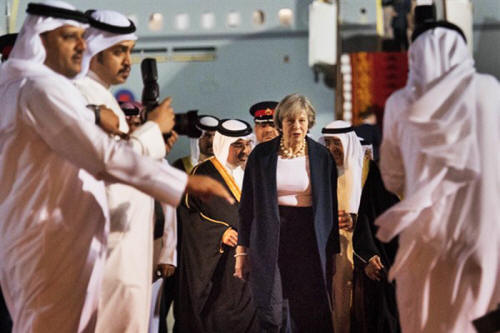|
December 06, 2016 from WPR Website
May, who took office in July in the
aftermath of the Brexit vote and Prime Minister David Cameron's
subsequent resignation, is the first British prime minister to
attend the GCC summit - and only the second Western leader to be
invited to do so, after France's Francois Hollande.
Against the backdrop of mounting
political uncertainty over both the nature of Britain's future
relations with European partners and its place in the world after
Brexit, government ministers have identified the GCC as a surer bet
for trade and investment deals.
Indeed, Cameron's first overseas visit as prime minister in 2010 was to the United Arab Emirates, which was followed by a bilateral UAE-U.K. taskforce.
Cameron lobbied the UAE intensively in an ultimately futile attempt to secure a Typhoon fighter contract for BAE Systems, as well as BP's participation in the renewal of Abu Dhabi's lucrative onshore oil concession.
The British government also launched a
government review of
the Muslim Brotherhood under
reportedly heavy pressure from the UAE and Saudi Arabia, which both
officially designated the group a terrorist organizations in March
2014.
That policy wasn't uniformly successful, as the BAE Systems and BP examples showed, while British ties with Saudi Arabia and the UAE were strained by parliamentary criticism of government crackdowns in both countries amid the upheavals of the Arab Spring in 2011.
However, the sustained ministerial focus on trade relations did help to strengthen British-Gulf relations as the initial phase of the Arab uprisings gave way to a set of protracted, violent and messy transitions. Trade between Britain and the UAE rose by more than 60 percent between 2009 and 2013 alone.
Moreover, since 2013, the Royal Navy has returned to the waters of the Gulf, which was under British protected status between 1820 and 1971.
Senior British politicians have even
revived the old colonial-era "east of Suez" terminology that had
faded for decades following Britain's military withdrawal from the
Gulf in 1971.
British policymakers adopted a "two kingdoms dialogue" with Saudi Arabia in the late 2000s, emphasizing their shared royal heritage, even if the initiative's results were disappointing.
Regular visits to the Gulf by Prince
Charles
and Prince Andrew, as well as Queen
Elizabeth's close relationship
to senior Gulf leaders, such as the emirs of Bahrain and Kuwait,
also allow Britain to project a degree of soft power and closeness
that most of its trade rivals simply cannot match.
Such an agreement is likely to feature highly on the agenda of May's visit to Bahrain this week, particularly as early hopes that Britain could reach similar trade deals with other international partners, such as Australia, have been rebuffed.
Although progress in any talks with the
GCC is likely to be slowed by a shortage of British trade
negotiators and uncertainty over Britain's ability to reach a
bilateral agreement until its withdrawal from the EU has been
completed, there is nevertheless a moment of
geopolitical opportunity for May and her government - given the
political scene in France and the United States, two countries with
major stakes in the Gulf.
But with Hollande announcing that he won't run for re-election next year - his chances were already slim if he had run again given his unpopularity - French outreach to the GCC could stall.
Hollande's successor will take time to
develop his or her own relations with GCC leaders, especially if
Marine Le Pen of the far-right Front National continues the
populist surge in Western politics and wins the presidency.
U.S.-GCC ties have come under pressure during the Obama administration, mainly over the Iran nuclear deal and Washington's actions during the Arab Spring.
But while many ruling elites in GCC
capitals openly looked forward to
rebuilding relations with a new administration,
few expected it to be with a president whose foreign policy
platforms have been so vague and ambiguous.
The one exception is Angela Merkel, provided she wins a fourth term as chancellor in Germany's own elections next year. But Merkel is hamstrung by having to negotiate with the GCC through the framework of the European Union, which has caused major friction in Gulf capitals through the persistent failure over 26 years to reach an EU-GCC trade agreement.
Progress on EU-GCC ties has long been undercut by the preference of European leaders to deal bilaterally with their GCC counterparts.
A Britain freed - eventually - from its EU shackles is very likely to prioritize a trade agreement with the GCC as a potential quick fix after Brexit.
|


